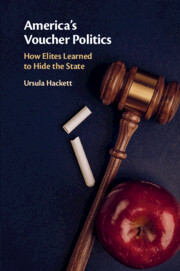Book contents
- America’s Voucher Politics
- America’s Voucher Politics
- Copyright page
- Contents
- Figures
- Tables
- Acknowledgments
- Abbreviations
- Introduction
- 1 America’s Foundational Identity Struggles
- 2 Two Dimensions of Attenuated Governance
- 3 The Racial Struggle
- 4 The Religious Struggle
- 5 The Public–Private Struggle
- 6 Tax Credit Scholarships in an Era of Republican Dominance
- 7 Education Savings Accounts and Controversies Beyond
- Conclusion
- Appendix
- References
- Index
5 - The Public–Private Struggle
Union Opposition and the Educational Establishment
Published online by Cambridge University Press: 20 April 2020
- America’s Voucher Politics
- America’s Voucher Politics
- Copyright page
- Contents
- Figures
- Tables
- Acknowledgments
- Abbreviations
- Introduction
- 1 America’s Foundational Identity Struggles
- 2 Two Dimensions of Attenuated Governance
- 3 The Racial Struggle
- 4 The Religious Struggle
- 5 The Public–Private Struggle
- 6 Tax Credit Scholarships in an Era of Republican Dominance
- 7 Education Savings Accounts and Controversies Beyond
- Conclusion
- Appendix
- References
- Index
Summary
In America’s public–private struggle, communitarians and individualists contest the appropriate relationship between states and markets. This chapter explains how teacher unions and school administrator associations rose to prominence in the middle of the twentieth century, empowering a communitarian order that supported public schools as civic institutions and bastions of community values. Individualist groups became more adept at countering union opposition during the latter half of the century, although they still faced the politically dangerous charge that they were intent upon undermining public schools. Hence, as the individualist order grew in strength, it utilized attenuated policy forms to disguise the diversion of public dollars from public institutions. The communitarian critique of vouchers – that they transfer money from public to private schools – helps explain the surprising absence of voucher programs in conservative states controlled by Republican administrations, such as Texas, Michigan, and Missouri. There, “strange bedfellow” alliances of Democrats and rural Republican legislators prevent these state legislatures from passing voucher legislation, because public school interests play an outsized role in rural districts.
Keywords
- Type
- Chapter
- Information
- America's Voucher PoliticsHow Elites Learned to Hide the State, pp. 108 - 136Publisher: Cambridge University PressPrint publication year: 2020

